The keyhole that we can find in the cover of Labirent (labyrinth in Turkish) let us have a glimpse to the rich and dark universe of the duo Ductape. With their album Ruh and their concert in Madrid, we learned a bit more about this stunning darkwave band. This year, they have released a couple of singles, preview of their upcoming new album Echo Drama, to be released in 2024. Next week, we will be able to listen to their next tracks in Madrid in a Bizarro party and also in Barcelona as part of the Ombra Festival.
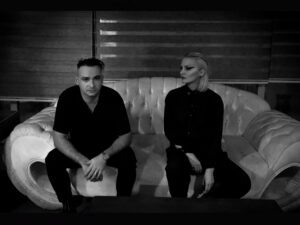 —Ductape was formed in 2019, wasn’t it? What impelled you to create the band?
—Ductape was formed in 2019, wasn’t it? What impelled you to create the band?
—Çağla: Yes, Ductape was formed in 2019. Furkan has a long history as a musician, but I have not. Furkan suggested that we should create something together, music that we both enjoy. As we moved forward with the idea, we started creating it and suddenly I found myself singing and playing for the first time.
—Furkan, you have been part of Apartmanlar and Softa, what can you please tell us of these bands and your experiences with them? You also collaborated in an EP of Deli Gömleği, right?
—Softa is a punk/post-punk band I formed when I was in university. We have released two albums so far. The band is on hold at the moment. Maybe someday in the future we might reunite.
Apartmanlar is a post-punk/noise rock band formed in 2018. We have released two EP’s so far, and we are working on a couple of new songs at the moment. Apartmanlar is a band of 6 with double drummers so it’s not easy to meet so often. We had to cancel a couple of shows due to the pandemic but we have played a few shows this year.
As for Deli Gömleği, I have been in the recording of one EP and played bass on a couple of live shows. It was a band I had been listening to for a long time and playing with them for a period was really fun.
—In these years after the creation of the band, do you think that the Turkishn dark scene has grown?
—Actually, there is a great potential in Turkey but there are not so many venues to support underground music. We can see that the scene is growing each day but still, as today, the bands can be counted on the fingers of one hand. Art Diktator and She Past Away have been leading the Turkish scene for some time.
—Çağla, what are your influences for the lyrics? Both thematically and stylistically.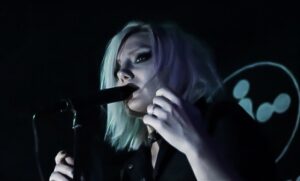
—I am mostly influenced by the chaotic world we live in. I love to express my rage, a rage that is painted with the contradictions I experience with myself and the ones I see that others are having. I really love using contrast words and elements of life. Stylistically, I can’t say this or that. I always express a part of me in my own world of words. However I feel like singing it and, however, the song makes me feel like.
—Çağla, you are also in charge of the visual part of the band. How do you visualize Ductape?
—Without losing the feeling I had during the creation of a song, I listen to it repeatedly at different hours of a day and see how I feel again. During the creation of the album Labirent, I closed my eyes and saw myself stuck in a labyrinth, looking for a way out but still enjoying it somehow. I reached for a door and looked through a keyhole, thinking it would open to a new world, but it only opened to another labyrinth. Each room, each corridor represented a song for us. And finally, the cover art for the album had a primitive drawing of a keyhole.
—Do you think that living in a place like Istanbul has influenced your sound?
—Absolutely. Istanbul is a huge and crowded city with a lot of history. You can feel the weight of all that. It is an interesting city where tradition and modernism intertwine. On the streets you can feel the tension, chaos and stress. Then you enter a building, and you find yourself dancing carelessly till morning.
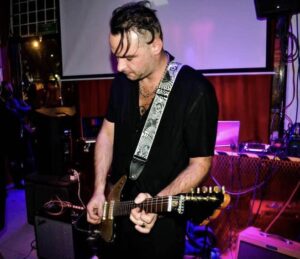 —Furkan, you have named DNA as a band that you like. Do you think the influence of this band can be heard in your music? What do you like of Arto Lindsay no-wave act?
—Furkan, you have named DNA as a band that you like. Do you think the influence of this band can be heard in your music? What do you like of Arto Lindsay no-wave act?
—When I first listened to DNA, I was shocked to see that a guitar could be played like that. It made me realise that music is not only mathematics, notes or can only be played with a standard technique. Combining noise with sound effects can be a way to express yourself. Especially with Apartmanlar and Softa you can hear their influence on my guitars. As for Ductape, you can feel it on my guitar effects and playing style. Arto Lindsay influenced a lot of people and cleared a path for new genres.
—The sound of your first EP Little Monsters, released by Tamar Records in June 2020 is quite different to what you did later in Labirent. It’s more aggressive and faster, and even Çağla sings in a different way. When and how do you decide to change your style in a more darkwave way?
—During the creation of Little Monsters, we were in quite a fast phase of our lives. As a result, the songs of the EP had higher BPM. With the pandemic, like everyone else, our lives slowed down. We started listening to our inner voice. We had more time to think about our music, but we never planned on changing anything. It occurred naturally. We have improved our music together.
—What can you please tell us of the recording of Labirent during the pandemic? Was it difficult to work under those conditions?
—We recorded the album with what we have in our home studio. It wasn’t that difficult, but you should probably ask our neighbors. We didn’t go to work thus we had a lot of time in our hands to work on the album. We recorded the songs whenever we wanted to. For the mixing process of the songs, we sent them to New Zealand. The only difficulty we had was the time difference between us, but we didn’t need many revisions so all went well.
—”Wooden Girl” lyrics are about domestic violence. Do you think music can make people think about this kind of social issues?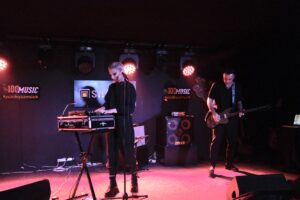
—Art always has a great impact on the masses. If we raise awareness, we are more than happy. Some things may not be seen in the news but can be heard in a song.
—Swiss Dark Nights also published your live performance recorded at Radyo Modyan. What can you also tell us about this? You had a drummer for this concert, do you usually play with him?
—We had an interview with Radyo Modyan and the idea of shooting a live performance came up that day. The drummer is a close friend of ours and he also plays with Apartmanlar and Softa. We asked him if he wanted to participate in the shooting of the live performance. We thought it would be good for the video. Traveling as a duo is easier so we didn’t have a chance to play with him again.
—In one of your reviews of your first album, the writer made a reference to your tribal-Anatolian melodies. Are you influenced by Turkish music too?
—We are probably influenced by it subconsciously. We have been hearing it for all of our lives. It’s in our culture.
—Your EP, Araf includes remixes by HAPAX, Delphine Coma and N.L.P. How did you select the remixers? N.L.P is a new Turkish project, right?
—We love them. We have been following and appreciating their work. When we had the idea of including remixes in the EP these three bands were the first to come up in our minds. N.L.P happened a few years ago. Matt does more electronic beats so we wanted a new perspective on our song. HAPAX and Delphine Coma are our friends from Swiss Dark Nights. That’s how we made contact. After hearing the remixes and see that the results are amazing, we knew that we made the right choice.
—You have recently played a second tour in Mexico, what can you please tell us of your experiences in the country?
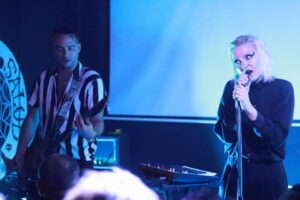 —Mexico is amazing! People are very friendly, and they are extremely dedicated to the scene. During the first tour, we had shows with Schrödinger, a great Mexican duo. We also had a chance to see the local bands and totally loved them. We heard so many great things about the Mexican scene, but it has been more than what we have expected in every aspect. We are looking forward to being there again in the future.
—Mexico is amazing! People are very friendly, and they are extremely dedicated to the scene. During the first tour, we had shows with Schrödinger, a great Mexican duo. We also had a chance to see the local bands and totally loved them. We heard so many great things about the Mexican scene, but it has been more than what we have expected in every aspect. We are looking forward to being there again in the future.
—Your previous album was released in 2022. Çağla, you said that the album was based on sin and sinners. Can you please tell us more about this?
—The album was called Ruh. We were absolutely excited about it at the moment. For the first time, it had a vinyl version.
While we may describe ourselves as non-believers, the concept of “sin” and “sinner” still captivates our interest in expressing certain emotions. We interpret sins as some behavioral distortions we recognize within ourselves. It shouldn’t always be perceived as negative; one should accept oneself as a whole. Therefore, we chose “Sinners” as the opening track of the Ruh album. We start the album by first accepting ourselves as we are, and similarly, the listener begins to listen to the album embracing themselves, accepting who they are.
With the song “Sevmiyor,” the person becomes imprisoned by their ego in the world they’ve created, acknowledging this confinement. On the other hand, “Hatırla” reminds someone who is now aware of their identity of the emotional splinters from the past. It serves as a reflection in the mirror, bringing awareness by recalling and confronting what made them who they are, emphasizing the significance of self-awareness.
—The video of the song “Sinners” was recorded in a peculiar way when you were visiting Pompeii. What inspired of the ruins to make a video out of it?
—As a former archaeologist, Pompeii has always captivated Çağla. It is like the raw material of songs we create, a fusion of melancholy and fire. The aura we feel in Pompeii is precisely composed of these two elements. In Pompeii, fire/lava in this case symbolizes both the natural disaster that occurred and the passionate atmosphere the city once experienced.
Most of our self-directed music videos are set in ancient, crumbling ruins or historical locations because we want them to truly reflect the emotion of the songs. Having a show in Salerno, only half an hour away from Pompeii, was a sign for us to go there and shoot the video for “Sinners”.
—Before the new album, you have done a cover of The Sisters of Mercy’s “Marian”, how was the idea born? Any other classic that you would like to cover?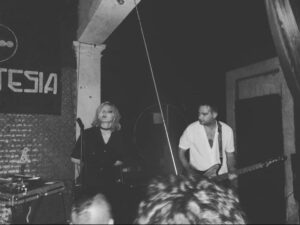
—We usually act based on our emotions. The idea of a cover song wasn’t planned; during that time, “Marian” often filled our emotional void, so we decided to share it while playing at home. There isn’t currently any other thought of another cover song.
—The band has made a remix for This Eternal Decay, the first one ever if I am not wrong. Can you please tell us more about how was your approach to remixing? Do you would like to make more?
—Yes, it’s our first remix. When it comes to discussions about remixing, it excites us a lot because trusting others with your own piece is a challenging situation. First and foremost, we try to create a version that we ourselves would enjoy and adapt our own sound. It involves considering the BPM of the track and starting with guitars, for example. Since it’s a piece created by someone else, it’s certainly a stressful process, but being able to look at the track from an outsider’s perspective and attempting to give it a different direction adds another layer of challenge.
—Çağla, you have collaborated with two Italian projects, Terminal Serious and Chemical Waves, what can you please tell us about this? We have been following Chemical Waves’ music for a while.
—It is always a pleasure to collaborate with other projects, it gives us a different perspective
We formed a great friendship with Terminal Serious over time. When he shared the idea of doing a duet with us, it was a delight to accompany this beautiful song. Luigi’s deep and dark voice adds a vibrant touch to the spirit of the song.
Chemical Waves is a talented musician who has collaborated with many artists. We believed that Turkish lyrics would suit the song well in the world of an Italian project where all lyrics would originate from us, and it turned out to be an enjoyable collaboration.”
—So far the first two singles from the new album have been released. Both in English, are you going to continue combining it with Turkish?
—The reason the first two singles from our new album are in English is due to a significant surprise planned for the release of the third single. This upcoming Turkish song, set to be released just before the album, will be the final single. We are planning to release it in early January. We are very excited. There will also be a couple of songs in Turkish in the upcoming album “Echo Drama.
—The second single, “Veil Of Lies” sounds a bit more commercial and danceable. Is this a direction that you want to follow in the future?
—The song “Veil of Lies” holds a special place for us. This year, we left our long-lost love Istanbul and moved to beautiful Ankara. Although Furkan is originally from Ankara, it was my (Çağla) first time living in a city other than Istanbul, and “Veil of Lies” became the first song we created in Ankara. We believe the distinctiveness in sound may be attributed to the abrupt change in our lives. Ankara being perceived as a darker and more depressive city than Istanbul, this song was a real surprise for us. It’s actually the very first song we made in major scale.
—What can you please advance us of your upcoming new album Echo Drama?
—Echo Drama is going to be a “Symphony of Emotions” for sure. Each and every one of the songs are going to be in a different shade of grey, perfectly aligned in the universe of the unfitted.
—What can we expect of you concert at Ombra and Madrid?
—We will be playing our new singles, the “Marian” cover and an unreleased song from the upcoming album. Looking forward to it!




